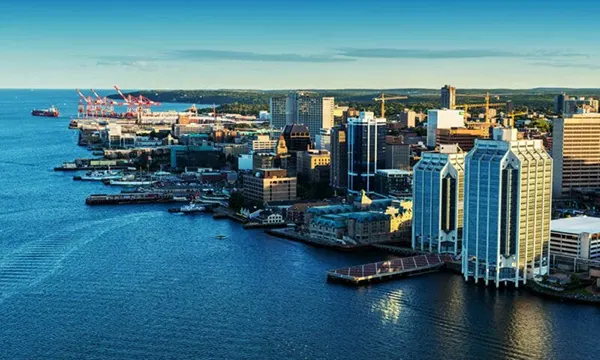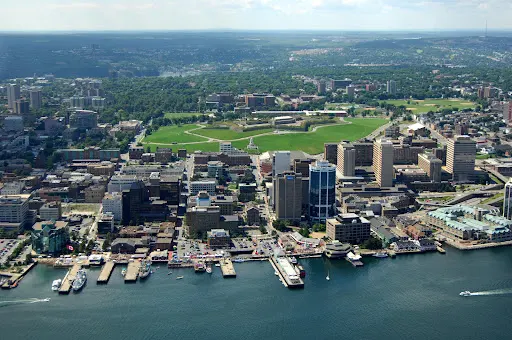Halifax (Canada): The Spirit of History, Ocean and Festivals

Halifax, the capital of Nova Scotia, is one of the most distinctive coastal cities in Canada. With its rich seafaring heritage, lively cultural events and deep ties to the Atlantic Ocean, it has become a point of attraction for both locals and travellers. The city blends historic charm with modern dynamism, creating a unique atmosphere that reflects Canada’s maritime character.
The Historic Roots of Halifax
Founded in 1749, Halifax has long been a strategic harbour and a significant centre for naval operations. Today, reminders of its military and maritime past remain visible across the city, from Citadel Hill to the old dockyards. These landmarks illustrate how Halifax grew from a fortified settlement into a thriving urban hub with global connections.
The Halifax Citadel National Historic Site is one of the most recognisable symbols of the city. Standing on a hill, it not only offers panoramic views but also highlights the role Halifax played during conflicts such as the War of 1812 and the World Wars. Historical re-enactments and exhibitions bring the site to life for visitors year-round.
Equally important is Pier 21, often referred to as Canada’s “Ellis Island”. Between 1928 and 1971, it welcomed almost one million immigrants to Canada. Today, the Canadian Museum of Immigration at Pier 21 preserves personal stories and historical documents, making it an invaluable resource for understanding Canada’s multicultural heritage.
Cultural Significance of Heritage
Halifax has invested in preserving and interpreting its past, ensuring that history remains accessible to future generations. Museums, restored buildings and guided tours highlight the city’s role in Canadian development. This strong historical awareness underpins Halifax’s identity as more than just a modern city by the sea.
Local communities also take pride in sharing traditions and stories that connect the present with the past. Maritime folklore, tales of shipbuilding and the memory of the Halifax Explosion of 1917 form an integral part of the city’s collective narrative.
By combining history with cultural education, Halifax provides residents and visitors alike with a sense of continuity, ensuring its heritage remains a living element of city life rather than a distant memory.
The Ocean and Maritime Life
Halifax’s location on the Atlantic Ocean has shaped every aspect of its identity. The harbour, one of the largest natural harbours in the world, remains vital for trade, tourism and naval operations. Fishing, shipbuilding and marine research continue to play a crucial role in the local economy.
The waterfront is a central gathering place, lined with seafood restaurants, markets and attractions. Visitors can watch naval ships, ferries and yachts move across the harbour while enjoying the relaxed coastal atmosphere. The Maritime Museum of the Atlantic, with exhibits about the Titanic and naval history, is also situated here.
Marine research has become increasingly important as Halifax contributes to global efforts in ocean science. Institutions such as Dalhousie University lead studies on climate change, marine biodiversity and sustainable fishing, reinforcing Halifax’s role as a key centre for ocean-related innovation.
Daily Life by the Sea
Living in Halifax means being closely connected to the rhythms of the ocean. From whale-watching excursions to ferry rides across the harbour, the sea is an everyday presence that shapes both work and leisure. Residents often say that the ocean provides not only livelihood but also peace of mind.
The strong maritime influence is also visible in local cuisine. Fresh Atlantic lobster, scallops and mussels are staples of Halifax’s dining scene, reflecting both tradition and modern culinary trends. Seasonal seafood festivals further highlight the importance of the ocean to the city’s lifestyle.
This ongoing relationship with the ocean ensures that Halifax remains not just a historic seaport but a living maritime community where the sea defines culture, economy and identity.

Festivals and Modern Culture
Halifax is also recognised for its vibrant cultural calendar. The city hosts numerous festivals throughout the year, celebrating everything from music and film to food and multiculturalism. These events highlight the city’s modern character while reinforcing its strong community spirit.
The Halifax International Busker Festival brings performers from around the world to the waterfront each summer, creating a lively atmosphere of street art, music and comedy. Meanwhile, the Atlantic Film Festival showcases international and Canadian cinema, drawing industry professionals and audiences alike.
Music also plays a central role in the city’s cultural life. From the Halifax Jazz Festival to Celtic-inspired celebrations, the city’s musical events reflect both its heritage and its contemporary creativity. These festivals not only attract visitors but also provide local artists with platforms to reach broader audiences.
Community and Cultural Identity
Festivals in Halifax do more than entertain – they bring communities together. They foster dialogue between cultures, showcase local talent and provide opportunities for small businesses to thrive. This makes them integral to the city’s social and economic fabric.
Such events also strengthen Halifax’s reputation internationally. By hosting artists, musicians and filmmakers, the city presents itself as an open and welcoming destination where tradition meets innovation. This cultural exchange enriches both visitors and residents.
In 2025, Halifax continues to balance its historic identity with a forward-looking vision. Through festivals, cultural initiatives and its strong maritime spirit, the city embodies both resilience and creativity, ensuring its place as one of Canada’s most distinctive coastal centres.
